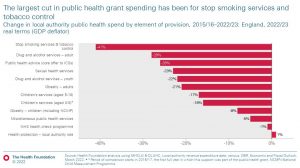After over a 100 years of progress, the health and well being of the British public is now going in reverse, according to Andy Haldane, the chief executive of the Royal Society of Arts giving the Health Foundation’s REAL Challenge lecture.
“We’re in a situation for the first time, probably since the Industrial Revolution, where health and wellbeing are in retreat,” he said.
This trend can be seen in recent data published by the Health Foundation on the increasing number of people aged 50-69 not working due to ill health.
The reasons for this trend are complicated, but the Health Foundation noted that although Covid-19 is a factor, due to long Covid and the backlog in health care, the problem began before the pandemic.
One major factor is that just as public health services have been the main driver of increasing the health of the population for more than one hundred years, their downgrading and underfunding over successive Conservative governments is now a major contributor to a reversal of all those years of progress and a reduction in the health and wellbeing of the nation.
Therese Coffey’s short-lived tenure at the DHSC and Liz Truss’s as PM briefly highlighted public health services and they became the subject of headlines, as it was reported that anti-smoking and anti-obesity measures would be reversed or not put in place. With Coffey and Truss gone, public health services have once again faded into the background of concerns, with A&E waits and ambulance backlogs taking up the headlines.
But history has shown that public health services are the most important component of healthcare – they are the services that focus on disease prevention and over more than 160 years, they have almost doubled life expectancy for men and women, and enabled the UK population to live much healthier and longer lives than each previous generation, and thereby remain active in the community for longer either working or volunteering.
Public health services provide preventative services, including smoking cessation, drug and alcohol services, children’s health services, including health visitors, and sexual health services, as well as broader public health support across local authorities and the NHS. They are provided primarily by local authorities, although some service provision is shared with the NHS, and are funded by a grant from the Department for Health and Social Care (DHSC) budget.
The public health interventions put in place by local authorities are excellent value for money. Calculations by researchers at Cambridge University show that each additional year of good health achieved in the population by public health interventions costs £3,800, which is three to four times lower than the cost resulting from NHS interventions of £13,500.
The researchers suggest that investing in local public health programmes would generate longer and more healthy lives than equivalent spend in the NHS.
One would think that given the overwhelming evidence of excellent value for money of public health interventions and their importance for a healthy population that would ultimately rely less on the NHS, a government would do everything it could to promote and fund public health services. That it would not just protect public health spending in real terms, but actively increase it in absolute terms.
Well you’d be wrong, in fact the exact opposite has taken place over the past 12 years of Conservative governments.
An editorial in the BMJ in September 2022, highlighted how after over 10 years of Conservative government the importance of public health services has been downgraded and they have been chronically underfunded.
The editorial notes that since 2010, successive Westminster governments have “dismantled and defunded public health rather than recognising the importance of a healthy population and a robust and effective public health function.”
The central public health agency, Public Health England, has been abolished and replaced by the UK Health Security Agency, and this has dropped public health from its title. Three of the four chief medical officers in the UK are not public health doctors and local directors of public health were transferred from the NHS to local councils, authorities which have at the same time been steadily underfunded.
As well as downgrading public health within the healthcare system in England and Wales, the actual amount of funding that is provided for public health services fell by £1 billion from 2014/15 to 2021/22, or by a massive 24%.
The cuts to funding have taken place across all local authorities, but it turns out that the areas seeing the biggest real-term per person cuts are those that are the most deprived with the poorest health outcomes – in fact those areas that are most in need of and will benefit the most from public health services.
For example Blackpool, ranked as the most deprived upper tier local authority in England, had the largest cut to its grant at £42 in real terms per person since 2015/16, according to the Health Foundation.
Back in 2019, the IPPR also found that the cuts in public health disproportionately affected the most deprived areas. When the IPPR compared the cuts in the most and least deprived ten local authorities, they found that “Almost £1 in every £7 cut from public health services has come from England’s ten most deprived communities – compared to just £1 in every £46 in the country’s ten least deprived places. The total, absolute cuts in the poorest places have thus been six times larger than in the least deprived.”
Analysis by The Health Foundation of spending from 2015/16 to 2021/22 found that some of the largest reductions in spend over the period were for stop smoking services and tobacco control, which fell by 41% in real terms, drug and alcohol services for adults (28%), and sexual health services (23%).

Despite a commitment in the Autumn 2021 Spending Review to maintain the public health grant in real terms until 2024/25, due to escalating inflation cuts will continue as the grant is already set to fall in real terms in 2022/23, according to analysis by The Health Foundation. There have already been severe cuts to services.
In April 2022, there was a cut of £100 million in funding for weight management services, due to be shared between the NHS and local councils, despite research showing that these services, a broad range of health advice, information and behaviour change support services, can be an effective intervention to support lasting health improvement. Another blow to public health services.
Sexual health services, in particular, are struggling. Danny Beales, Head of Policy & Campaigns at National AIDS Trust, in a recent HSJ article appealed for more money for these services, noting:
“The government must also urgently increase resources to sexual health services to relieve capacity issues. These services have been at breaking point due to public health funding decreasing for some time. Add to this the diversion of capacity to Monkeypox and potentially to help with the response to NHS winter pressures, the current situation is unsustainable. We risk waiting lists for PrEP piling up, and ultimately we will see transmissions of HIV that were entirely preventable.”
The ultimate effect of this reduction in public health services, is that opportunities to prevent the early deterioration of health will be missed – people who with the right interventions might have given up smoking or alcohol, will now go on to lead shorter, more unhealthy lives with all the additional negative consequences that can have for people around them and for costs to the NHS.
Ultimately a failure to invest in vital preventative services will mean poorer health for a higher proportion of the country’s population at a younger age, an increase in costs for the NHS, a fall in the number of people available to work, and the widening of health inequalities. In the long-term a lack of investment in public health services will have negative consequences across all of society and the economy.
Dear Reader,
If you like our content please support our campaigning journalism to protect health care for all.
Our goal is to inform people, hold our politicians to account and help to build change through evidence based ideas.
Everyone should have access to comprehensive healthcare, but our NHS needs support. You can help us to continue to counter bad policy, battle neglect of the NHS and correct dangerous mis-infomation.
Supporters of the NHS are crucial in sustaining our health service and with your help we will be able to engage more people in securing its future.
Please donate to help support our campaigning NHS research and journalism.


